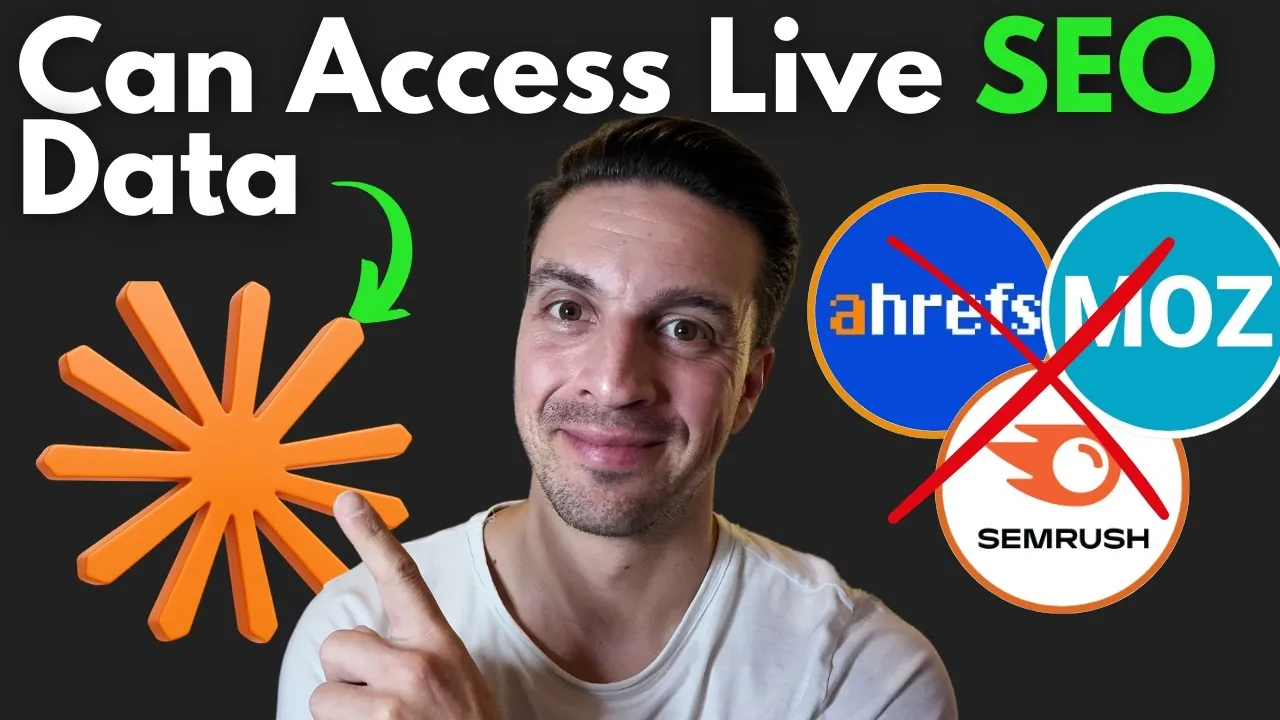
Imagine having a single tool that could streamline your entire SEO strategy—one that performs detailed audits, analyzes competitors, and uncovers high-impact keywords, all while saving you time and effort. Bold claim? Perhaps, but with the right setup, you can transform Claude, an AI-powered assistant, into exactly that: a comprehensive, all-in-one SEO powerhouse. By integrating Claude with real-time data sources like the Data for SEO MCP, you can replace a cluttered toolkit with a unified solution that simplifies even the most complex optimization tasks. In a world where search engine algorithms evolve constantly, the ability to adapt quickly and efficiently is not just an advantage—it’s a necessity.
This overview by Nico will guide you through the process of turning Claude into your ultimate SEO tool. You’ll discover how to configure it for advanced tasks like conducting on-site audits, analyzing competitors, and perfecting keyword research—all while using real-time SEO data for actionable insights. Whether you’re a seasoned marketer or new to the world of search engine optimization, this guide will show you how to unlock Claude’s full potential, combining AI capabilities with strategic data to stay ahead of the competition. The possibilities are vast, but the key lies in understanding how to harness them effectively.
SEO with Claude AI
TL;DR Key Takeaways :
Claude can be transformed into a powerful SEO tool by integrating it with real-time data from the Data for SEO MCP, streamlining workflows and consolidating multiple tools into one platform.
Key use cases include conducting on-site SEO audits, analyzing competitors’ strategies, and streamlining keyword research with advanced features like keyword clustering and trend monitoring.
Setting up Claude involves downloading the software, installing NodeJS, creating a Data for SEO account, and configuring settings for seamless API integration and compatibility.
Claude offers significant advantages such as automation, real-time data accuracy, and cost-effectiveness through a pay-as-you-go model, making it accessible for businesses of all sizes.
While highly effective, Claude requires user input for certain tasks and may need customization for niche industries or specialized SEO strategies.
Getting Started: Setup and Configuration
To prepare Claude for advanced SEO tasks, follow these essential steps:
Download Claude: Install the desktop version of Claude, which is compatible with both Mac and Windows operating systems, making sure accessibility across platforms.
Install NodeJS: Set up NodeJS, a JavaScript runtime environment, to enable seamless API integration and communication between Claude and external data sources.
Create a Data for SEO Account: Register for a Data for SEO account to gain access to real-time SEO data and obtain your API credentials for integration.
Configure Claude’s Settings: Use a code editor, such as Visual Studio Code, to adjust Claude’s settings file. This step ensures proper API permissions, workflow integration, and compatibility with your specific SEO requirements.
Completing these steps establishes the foundation for Claude to handle complex SEO tasks effectively, making sure a smooth and efficient setup process.
Use Case 1: Conducting On-Site SEO Audits
Claude excels at performing detailed on-site SEO audits, helping you identify and resolve technical, content, and user experience (UX) issues. By using real-time data, Claude delivers actionable insights in several critical areas:
Metadata Optimization: Analyze and refine title tags, meta descriptions, and header tags to improve search engine visibility and click-through rates.
Core Web Vitals: Evaluate key performance metrics, such as Largest Contentful Paint (LCP), First Input Delay (FID), and Cumulative Layout Shift (CLS), to enhance page performance and user satisfaction.
Page Load Speed: Identify bottlenecks affecting load times and provide recommendations to optimize website speed, making sure a better user experience.
The audit results are presented as a structured improvement plan, prioritizing both quick fixes and long-term strategies to enhance your website’s overall performance.
How to Use Claude AI for Advanced SEO
Here are additional guides from our expansive article library that you may find useful on Claude AI.
Use Case 2: Analyzing Competitors
Understanding your competitors’ SEO strategies is vital for maintaining a competitive edge in search rankings. Claude simplifies competitor analysis by examining key performance indicators, allowing you to refine your strategy effectively:
Keyword Rankings: Identify the keywords your competitors rank for, assess their search volume, and evaluate their difficulty to uncover opportunities.
Traffic Patterns: Monitor competitor traffic trends to discover seasonal opportunities, emerging topics, or gaps in their strategy.
Domain Authority: Compare the strength of competitor domains to benchmark your own performance and identify areas for improvement.
This analysis allows you to pinpoint keyword gaps, capitalize on your competitors’ weaknesses, and use your strengths to improve your search rankings.
Use Case 3: Streamlining Keyword Research
Keyword research is a cornerstone of SEO, and Claude offers advanced capabilities to discover, organize, and prioritize keywords for targeted optimization. Key features include:
Keyword Clustering: Group keywords by intent—commercial, informational, or navigational—to align your content with user needs and search intent.
Search Volume Analysis: Evaluate the popularity and competitiveness of keywords to focus on high-impact opportunities that drive traffic and conversions.
Trend Monitoring: Track keyword performance over time to identify emerging topics, seasonal trends, and shifts in user behavior.
Claude generates a clear, actionable keyword strategy, complete with timelines for implementation, making sure your efforts are both strategic and timely.
Advantages of Using Claude for SEO
Integrating Claude with real-time SEO data provides numerous benefits, making it a valuable tool for businesses of all sizes:
Efficiency: Automate complex tasks, such as data analysis and action planning, to save time and resources while maintaining accuracy.
Accuracy: Use high-quality, real-time data to make informed decisions that drive measurable results and improve your SEO outcomes.
Cost-Effectiveness: Use a pay-as-you-go API model, minimizing upfront costs and allowing for scalability as your needs grow.
By combining AI capabilities with reliable data, Claude simplifies SEO processes, making them accessible even to users with limited technical expertise.
Limitations to Consider
While Claude is a powerful and versatile tool, it does have some limitations that users should be aware of:
User Input Required: Certain tasks, such as generating AI-driven search overviews or crafting tailored strategies, require manual input and oversight.
Customization Needs: Highly specialized industries or niche SEO strategies may require additional training, tailored prompts, or custom configurations to achieve optimal results.
Despite these challenges, Claude remains an effective and adaptable solution for most SEO needs, offering a centralized platform for managing diverse tasks with ease.
Maximizing Claude’s Potential
By integrating Claude with the Data for SEO MCP, you can transform it into a comprehensive, all-in-one SEO tool. From conducting detailed on-site audits to analyzing competitors and streamlining keyword research, Claude enables you to optimize your website efficiently and effectively. Its cost-effective, pay-as-you-go model further enhances its value, making it an indispensable asset for businesses aiming to stay competitive in the ever-evolving digital landscape. Whether you are an experienced SEO professional or just starting, Claude provides the tools and insights needed to succeed in today’s search-driven environment.
Media Credit: Nico | AI Ranking
Filed Under: AI, Guides
Latest Geeky Gadgets Deals
Disclosure: Some of our articles include affiliate links. If you buy something through one of these links, Geeky Gadgets may earn an affiliate commission. Learn about our Disclosure Policy.

